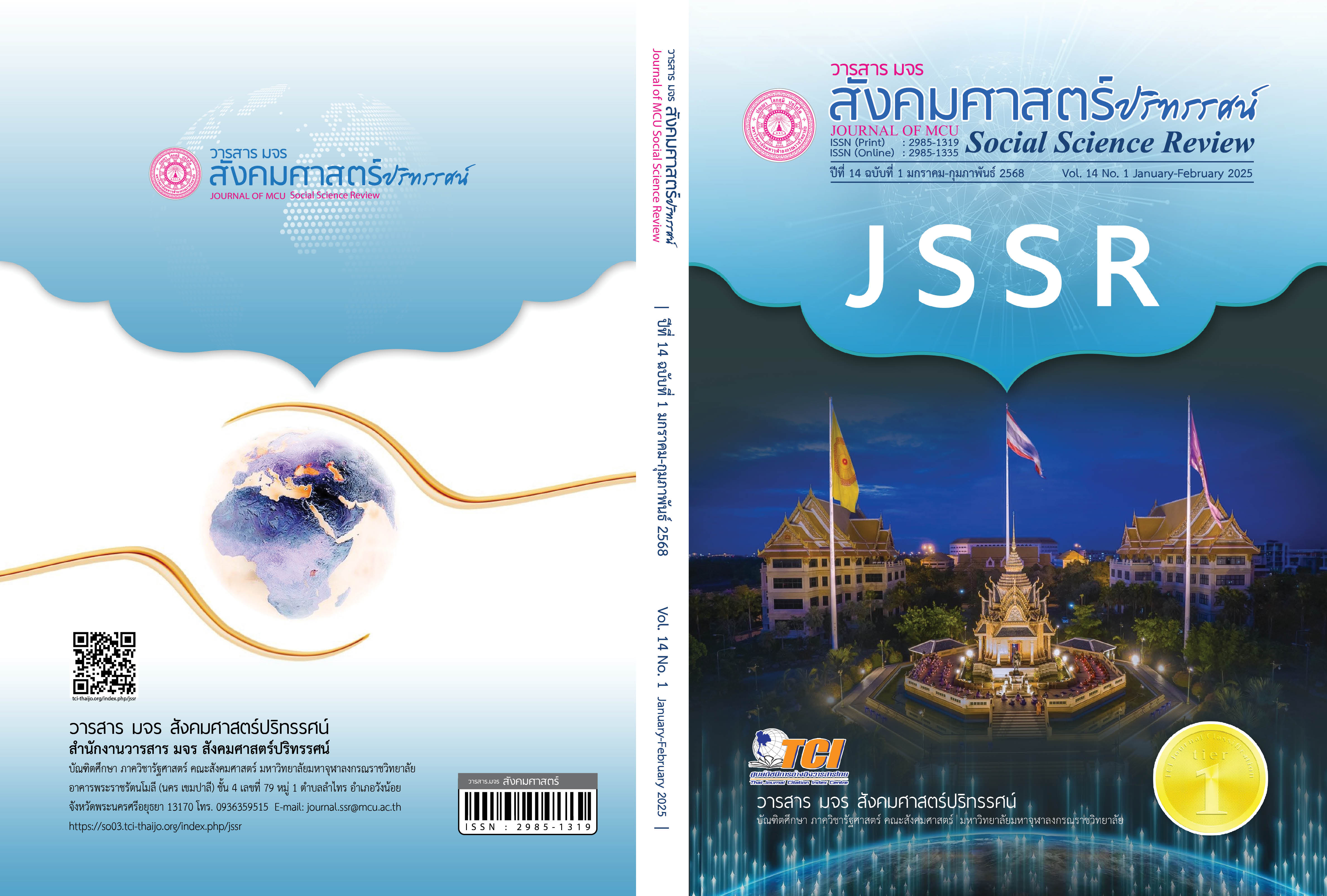การพัฒนาสื่อการเรียนรู้บอร์ดเกมสังคมศึกษาเพื่อเสริมสร้างทักษะการคิดวิเคราะห์และ ความยึดมั่นผูกพันในการเรียนของนักศึกษาครูสังคมศึกษา
คำสำคัญ:
สื่อการเรียนรู้บอร์ดเกม, สังคมศึกษา, ทักษะการคิดวิเคราะห์, ความยึดมั่นผูกพัน ในการเรียนบทคัดย่อ
บทความวิจัยนี้มีวัตถุประสงค์ 1. พัฒนาสื่อการเรียนรู้บอร์ดเกมสังคมศึกษาเพื่อเสริมสร้างทักษะการคิดวิเคราะห์และความยึดมั่นผูกพันในการเรียนของนักศึกษาครูสังคมศึกษา 2. ประเมินประสิทธิภาพของสื่อการเรียนรู้บอร์ดเกมสังคมศึกษาที่มีต่อทักษะการคิดวิเคราะห์และความยึดมั่นผูกพันในการเรียนของนักศึกษาครูสังคมศึกษา กลุ่มตัวอย่างที่ใช้ในการวิจัย คือ นักศึกษาครูสาขาวิชาสังคมศึกษา จำนวน 30 คน วิทยาลัยการฝึกหัดครู มหาวิทยาลัยราชภัฏพระนคร เครื่องมือที่ใช้ในการวิจัยประกอบด้วยแผนการจัดการเรียนรู้โดยใช้สื่อการเรียนรู้บอร์ดเกมสังคมศึกษา แบบทดสอบวัดทักษะการคิดวิเคราะห์ และแบบประเมินความยึดมั่นผูกพันในการเรียน ใช้เวลาในการทดลอง 8 สัปดาห์ วิเคราะห์ข้อมูลโดยการหาค่าเฉลี่ย (Mean) ค่าส่วนเบี่ยงเบนมาตรฐาน (Standard Deviation) และสถิติทดสอบค่าที (t–test)
ผลการวิจัยพบว่า 1. สื่อการเรียนรู้บอร์ดเกมสังคมศึกษาประกอบด้วย 6 องค์ประกอบสำคัญ ได้แก่ 1. ชื่อบอร์ดเกม 2. วัตถุประสงค์ 3. วัสดุและอุปกรณ์ 4. กติกาการเล่นเกม 5. ผู้เล่น และ 6. เรื่องราว คุณภาพของสื่อการเรียนรู้บอร์ดเกมสังคมศึกษาอยู่ในระดับมากที่สุดและมีประสิทธิภาพ (E1/E2) เท่ากับ 81.11/83.44 ซึ่งเป็นไปตามเกณฑ์ 80/80 2. นักศึกษาครูสังคมศึกษาที่เรียนรู้โดยใช้สื่อการเรียนรู้บอร์ดเกมสังคมศึกษามีทักษะการคิดวิเคราะห์และความยึดมั่นผูกพันในการเรียนสูงกว่าก่อนเรียนอย่างมีนัยสำคัญทางสถิติที่ระดับ 0.05
เอกสารอ้างอิง
Aksornkan, S. (2019). The Study of the Analytical Thinking Ability of the Students in Faculty of Education, Suratthani Rajabhat University. Ratchaphruek Journal, 17(2), 24-32.
Brandt W. C. & Lorié, W. (2024). Measuring Student Success Skills: A Review of the Literature on Analytical Thinking. Retrieved July 20, 2024, from https://files.eric.ed.gov/fulltext/ED660549.pdf
Buranasinvattanakul, K. (2019). The development of instruction media in board game to enhance the capability in the Development of Thai Textbook and the happiness in learning for undergraduate students (Research Report). Bangkok: Srinakharinwirot University.
Chunthed, J. (2019). Designing A Board Game to Promote English Vocabulary Learning. (The Degree of Master of Education in Learning Sciences and Educational Innovation). Pathumthani: Thammasart University.
Kruedsanoi, P. & Kaewpuang, P. (2023). Development of Educational Game Activity Packages for Enhancing Learning Engagement and Learning Achievement in Economics for Seventh Grade Students. Journal of MCU Social Science Review. 12(3), 150-165.
Office of the Education Council. (2017). National Education Plan B.E. 2560-2579. Bangkok: Prikwhan Graphic.
Soomprasert, B. (2024, 19 June). Head of Social Studies Program, Phanakhon Rajabhat University. (Interview).
Soybilge, A. (2014). Effects of Mind Improving Board Games on Analytical Thinking. (Doctoral Thesis). Turkey: Izmir University of Economics.
Srisa-ard, B. (2017). Introduction to Research. (10th ed.). Bangkok: Suwiriyasan.
World Economic Forum. (2023). The Future of Jobs Report 2023. Retrieved July 20, 2024, from https://www.weforum.org/publications/the-future-of-jobs-report-2023/
ดาวน์โหลด
เผยแพร่แล้ว
รูปแบบการอ้างอิง
ฉบับ
ประเภทบทความ
สัญญาอนุญาต
ลิขสิทธิ์ (c) 2024 วารสาร มจร สังคมศาสตร์ปริทรรศน์

อนุญาตภายใต้เงื่อนไข Creative Commons Attribution-NonCommercial-NoDerivatives 4.0 International License.
เพื่อให้เป็นไปตามกฎหมายลิขสิทธิ์ ผู้นิพนธ์ทุกท่านต้องลงลายมือชื่อในแบบฟอร์มใบมอบลิขสิทธิ์บทความให้แก่วารสารฯ พร้อมกับบทความต้นฉบับที่ได้แก้ไขครั้งสุดท้าย นอกจากนี้ ผู้นิพนธ์ทุกท่านต้องยืนยันว่าบทความต้นฉบับที่ส่งมาตีพิมพ์นั้น ได้ส่งมาตีพิมพ์เฉพาะในวารสาร มจร สังคมศาสตร์ปริทรรศน์ เพียงแห่งเดียวเท่านั้น หากมีการใช้ภาพหรือตารางหรือเนื้อหาอื่นๆ ของผู้นิพนธ์อื่นที่ปรากฏในสิ่งตีพิมพ์อื่นมาแล้ว ผู้นิพนธ์ต้องขออนุญาตเจ้าของลิขสิทธิ์ก่อน พร้อมทั้งแสดงหนังสือที่ได้รับการยินยอมต่อบรรณาธิการ ก่อนที่บทความจะได้รับการตีพิมพ์ หากไม่เป็นไปตามข้อกำหนดเบื้องต้น ทางวารสารจะถอดบทความของท่านออกโดยไม่มีข้อยกเว้นใดๆ ทั้งสิ้น





